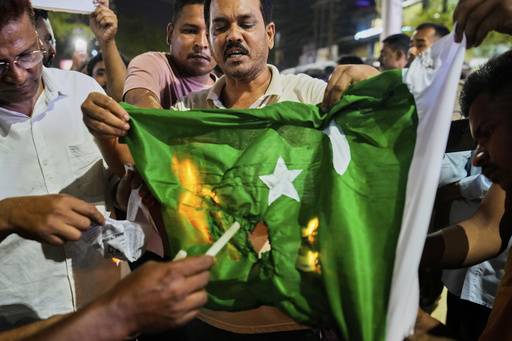Kashmir attack prompts India to downgrade ties with Pakistan

SRINAGAR, India—India blamed Pakistan on Wednesday for a militant attack that killed 26 people in Indian-held Kashmir, downgrading diplomatic ties and suspending a crucial water-sharing treaty that has withstood two wars between the nuclear-armed rivals.
The spray of gunfire at tourists Tuesday in a scenic, mountain-ringed valley was the worst assault in years targeting civilians in the restive region that is claimed by both countries. The unidentified gunmen also wounded 17 other people.
India’s foreign secretary, Vikram Misri, announced the diplomatic moves against Pakistan at a news conference in New Delhi late Wednesday, saying a special cabinet meeting called by Prime Minister Narendra Modi decided that the attack had “cross-border” links to Pakistan.
However, the government provided no evidence of this publicly.
Pakistan said it would respond more fully to India’s actions on Thursday, but in the meantime Pakistani defense minister Khawaja Mohammad said that India was using “an unfortunate incident of terrorism” as a pretext to jettison a treaty it has long been trying to evade.
Water treaty suspended
India describes militancy in Kashmir as Pakistan-backed terrorism. Pakistan denies this, and many Muslim Kashmiris consider the militants to be part of a home-grown freedom struggle.
Misri said that the Indus Water Treaty would be suspended “until Pakistan credibly and irrevocably abjures its support for cross-border terrorism.”
He said a number of Pakistani diplomats in New Delhi were asked to leave, and Indian diplomats were recalled from Pakistan, reducing diplomatic officials for both countries from 55 to 30.
Misri also said the main land border crossing between the countries would be closed.
Pakistan’s foreign minister Ishaq Dar said his country would respond to the Indian government’s decisions after a high-level meeting chaired by Prime Minister Shehbaz Sharif on Thursday.
The Indus Water Treaty, brokered by the World Bank in 1960, allows for sharing the waters of a river system that is a lifeline for both countries, particularly for Pakistan’s agriculture.
The treaty has survived two wars between the countries, in 1965 and 1971, and a major border skirmish in 1999.
‘Terror attack’
Indian forces on Wednesday launched a manhunt for the assailants. Tens of thousands of police and soldiers fanned out across the region and erected additional checkpoints.
They searched cars, used helicopters to search forested mountains and in some areas summoned former militants to police stations for questioning, reports said. Many shops and businesses in Kashmir closed to protest the killings.
Police called the assault a “terror attack” and blamed militants fighting against Indian rule.
Indian defense minister Rajnath Singh vowed to “not only trace those who perpetrated the attack but also trace those who conspired to commit this nefarious act on our soil.”
Kashmir Resistance, a previously unknown militant group, claimed responsibility for the attack on social media. The group said Indian authorities had settled over 85,000 “outsiders” in the region and claimed that those targeted on Tuesday were not “ordinary tourists” but “were linked to and affiliated with Indian security agencies.”
The group’s messages could not be independently verified.
Earlier this month, the local government told its legislature that 83,742 Indians were granted rights to buy land and property in Kashmir in the last two years.

















